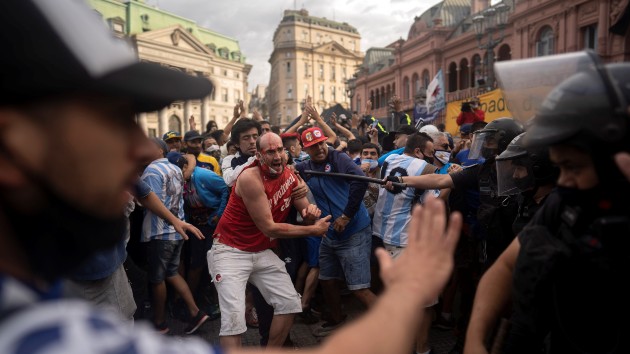
Martin Zabala/Xinhua via Getty ImagesBy JOE GOLDMAN and MATT ZARRELL, ABC News
(BUENOS AIRES) — Police shot tear gas and rubber bullets into a massive crowd that lined the streets of Buenos Aires, Argentina, on Thursday to pay their respects to soccer legend Diego Maradona, who died on Wednesday at the age of 60.
The procession line, which stretched from Constitution rail station to the government house where Maradona lies in state, includes people from all walks of life, many of whom have come from faraway provinces where COVID-19 has hit hard, with many having been in lockdown for weeks or months.
It is unclear what lead police to take action against the crowd — an unknown number of injuries were reported in the incident. Police in Buenos Aires did not immediately return ABC News’ request for comment.
“We demand that the mayor and city security minister stop this craziness carried out by the city police force,” said Interior Minister Waldo de Pedro.
Following the news of Maradona’s death, millions of Argentines went out on their balconies, sidewalks and streets all over the country — even in the throes of a deadly pandemic — to give their idol a sustained round of applause. The city’s landmarks, stadiums, parks, plazas and the house where he died in the northern suburbs was filled with wreaths left by admirers.
In response to the death, Argentine President Alberto Fernandez declared three days of national mourning.
Maradona died of a heart attack after being released from a hospital in Buenos Aires following brain surgery, according to reports.
Born in Villa Fiorito in October 1960, Maradona first turned pro in his early teens, dominating at two Argentine clubs, Argentino Juniors and Boca Juniors, before becoming a household name with professional clubs in Europe including Barcelona and Napoli.
“I remember Diego living in an apartment in Naples when he played there and I would visit and there were always, I mean always a crowd of fans outside his window,” local sports writer Alejandro Apo said on Wednesday.
Maradona’s crowning achievement came as he led Argentina to the 1986 World Cup championship, which included his infamous “Hand of God” goal, to defeat England in the quarterfinal.
The soccer legend’s career was not without controversy — drug and alcohol addictions, along with a heavy interest in nightlife led to a steep downfall. During the 1994 World Cup in the United States, he failed a routine post-game drug test and was suspended for the remainder of the tournament.
The importance of Maradona to Argentina’s national identity is perhaps best embodied by writer Roberto Fontanarrosa, who said, “It’s not important to me what Diego did with his life, it’s important what he did to mine.”
Copyright © 2020, ABC Audio. All rights reserved.
